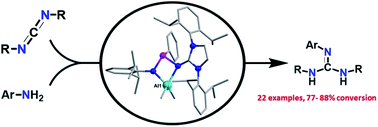Aluminium alkyl complexes supported by imino-phosphanamide ligand as precursors for catalytic guanylation reactions of carbodiimides†
Abstract
Herein, we report the synthesis, characterisation, and application of three aluminium alkyl complexes, [κ2-{NHIRP(Ph)NDipp}AlMe2] (R = Dipp (2a), Mes (2b); tBu (2c), Dipp = 2,6-diisopropylphenyl, Mes = mesityl, and tBu = tert-butyl), supported by unsymmetrical imino-phosphanamide [NHIRP(Ph)NDipp]− [R = Dipp (1a), Mes (1b), tBu (1c)] ligands as molecular precursors for the catalytic synthesis of guanidines using carbodiimides and primary amines. All the imino-phosphanamide ligands 1a, 1b and 1c were prepared in good yield from the corresponding N-heterocyclic imine (NHI) with phenylchloro-2,6-diisopropylphenylphosphanamine, PhP(Cl)NHDipp. The aluminium alkyl complexes 2a, 2b and 2c were obtained in good yield upon completion of the reaction between trimethyl aluminium and the protic ligands 1a, 1b and 1c in a 1 : 1 molar ratio in toluene via the elimination of methane, respectively. The molecular structures of the protic ligands 1b and 1c and the aluminium complexes 2a, 2b and 2c were established via single-crystal X-ray diffraction analysis. Complexes 2a, 2b and 2c were tested as pre-catalysts for the hydroamination/guanylation reaction of carbodiimides with aryl amines to afford guanidines at ambient temperature. All the aluminium complexes exhibited a high conversion with 1.5 mol% catalyst loading and broad substrate scope with a wide functional group tolerance during the guanylation reaction. We also proposed the most plausible mechanism, involving the formation of catalytically active three-coordinate Al species as the active pre-catalyst.



 Please wait while we load your content...
Please wait while we load your content...